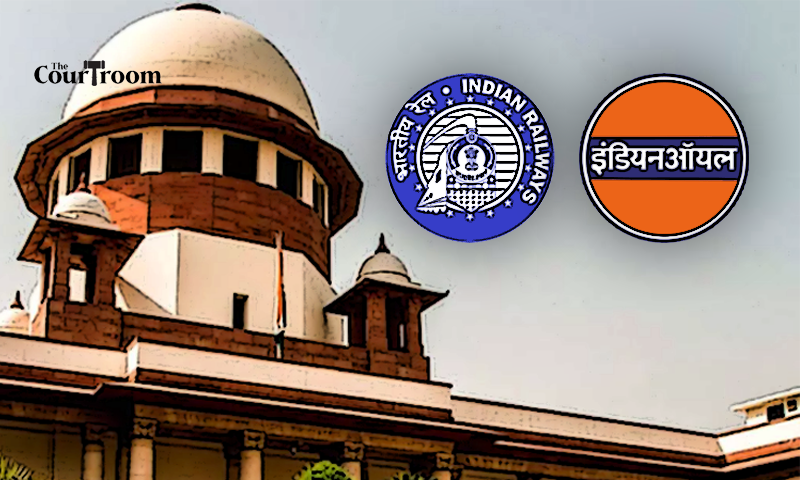Supreme Court Rejects Railways’ Appeals Dismissed in Freight Charges Dispute
In a landmark decision, the Supreme Court ruled against the Railways in a case involving excessive freight charges levied on the Indian Oil Corporation Limited (IOC). The court found that the Railways had imposed an illegal cha`rge on IOC for a distance of 444 kms, whereas the actual relevant distance was only about 334 kms.
The judgment was delivered by a Bench comprising Justice JB Pardiwala and Justice Sandeep Mehta. The court dismissed the appeals filed by the Railways against the Allahabad High Court’s order, which had ruled in favor of IOC.
Background of the Case
Between 2002 and 2005, IOC had booked furnace oil consignments with the Railways for transportation over a specific route. The freight charges were calculated based on a ‘chargeable distance’ of 444 kms, as per the prevailing distance table. However, in April 2004, the Railways changed the method of calculating the chargeable distance, which resulted in rounding off values and required a revision of distance tables.
IOC later discovered that there had been no actual change in the physical track length for the route in question. The real distance was found to be 333.18 kms, but the Railways continued to charge freight based on a chargeable distance of 444 kms. Upon realizing this discrepancy, IOC sent a notice of claim to the Railways, demanding a refund for the difference of 110 kms in the freight charges. This demand was related to 122 consignments. However, the Railways rejected all claims.
Subsequently, IOC approached the Railway Claims Tribunal seeking similar relief. After several meetings between the parties, 45 claims were refunded as they were made within the 6-month statutory period under Section 106 of the Railways Act, 1989, which deals with the notice for the claim of compensation and refund of overcharge.
The Tribunal dismissed the remaining 77 applications as time-barred, stating that the claims were not made within the 6-month statutory period and the refund was sought for an ‘overcharge’. However, the Tribunal acknowledged that the chargeable distance was only 334 kms, despite the fact that freight charges had been levied for 444 kms. Aggrieved by this decision, IOC appealed to the Allahabad High Court, which ruled in favor of IOC, stating that the case involved an “illegal charge” and not an “overcharge”. The Railways then approached the Supreme Court against the High Court’s order.
Key Issues
The Supreme Court considered the following questions in its judgment:
- What is the scope of Section 106(3) of the Railways Act, 1989, and what constitutes an “overcharge” within the meaning of the provision? What is the difference between an “overcharge” and an “illegal charge”?
- Was IOC’s claim for a refund of the difference of 110 kms in freight charges related to an ‘overcharge’ and/or covered by Section 106(3)?
- Was the difference of 110 kms in freight charges liable to be refunded? Was the notified chargeable distance of ‘444 kms’ an illegal charge or not?
Court’s Observations
The Supreme Court observed that Section 106(3) of the Railways Act, 1989, which imposes a 6-month time limit for making a notice of claim, applies only when the refund is for an overcharge. If the claim is for anything other than an ‘overcharge’, no notice of claim is required.
The court defined an ‘overcharge’ as any sum charged in excess or more than what was legally payable. In contrast, an ‘illegal charge’ is any sum that is impermissible in law.
The court clarified that merely applying an incorrect or higher slab-rate does not make it an illegal charge, as long as the charge itself was not objectionable.
The court distinguished between ‘overcharge’ and ‘illegal charge’, stating that for an excess sum to be an “overcharge”, it must belong to the same category of charge that was legally payable. On the other hand, for an ‘illegal charge’, the sum must not have been payable by law.
The court further noted that while an ‘overcharge’ is generally specific to the parties involved and the particular circumstances, an ‘illegal charge’ is illegal for everyone, regardless of the parties or circumstances.
Regarding the time-barred notice of claims, the court emphasized that for a sum to be considered an overcharge, it must have been an overcharge at the time of payment. If the sum was not an overcharge at the time of payment, it cannot become an ‘overcharge’ due to subsequent events.
The court concluded that Section 106(3) does not cover “Illegal Charges”, and the time limit prescribed must only apply to claims for an ‘overcharge’.
In the present case, since IOC’s objection was to the chargeable distance of 444 kms and not the incidental freight levied on it, and considering that the distance was charged in accordance with prevailing law and not due to any misapplication, the court held that the case involved an illegal charge.
On the facts of the case, the court opined that a mere change in the method of computing the chargeable distance would not result in a difference of 110 kms. Given that the Railways failed to prove that 444 kms was the correct chargeable distance, the court declared that the computation was illegal. Consequently, the Railways’ appeals were dismissed.
Case Details
Case Title: Union of India v. M/s Indian Oil Corporation Ltd., Civil Appeal Nos. 1891-1966 of 2024
Click here to read the judgement.


